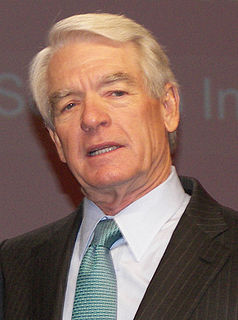A Quote by Barry Ritholtz
Owning a variety of asset classes means that some part of your portfolio will be doing well when the cyclical turmoil arises. A broadly diversified portfolio includes large capitalization stocks, small cap, emerging markets, fixed income, real estate and commodities.
Related Quotes
If the investor doesn't have enough time and skill to investigate individual stocks or enough money to diversify a portfolio, the right thing to do is to invest in exchange-traded funds that give you exposure to asset classes. It does make sense for the individual investor to think in terms of holding individual asset classes.
There is one thing of which I can assure you. If good performance of the fund is even a minor objective, any portfolio encompassing one hundred stocks (whether the manager is handling one thousand dollars or one billion dollars) is not being operated logically. The addition of the one hundredth stock simply can't reduce the potential variance in portfolio performance sufficiently to compensate for the negative effect its inclusion has on the overall portfolio expectation.






























